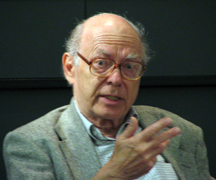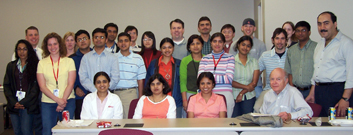 Nobel Prize winner Irwin Rose, Ph.D., isn’t looking at the science of tomorrow.
Nobel Prize winner Irwin Rose, Ph.D., isn’t looking at the science of tomorrow.
“I’m interested in the science of yesterday,” he told a near capacity crowd Monday (April 24) in the Durham Research Center Auditorium, noting science holds many unanswered questions worth pursuing.
Dr. Rose, the Department of Biochemistry and Molecular Biology’s student-invited speaker, received the 2004 Nobel Prize for Chemistry with Aaron Ciechanover and Avram Hershko, both of the Israel Institute of Technology, Haifa, Israel.
On Monday, Dr. Rose explained in detail the award-winning discovery of how the body breaks down unwanted protein at the cellular level. The trio’s research offered an opportunity to develop drugs against cervical cancer, cystic fibrosis and other diseases.
“My general philosophy was to solve problems, not to win a Nobel prize,” said Dr. Rose, now a professor emeritus of physiology and biophysics at the College of Medicine, University of California, Irvine. “It just happened. If I hadn’t won, I would have had one or two papers more.”
All living things — plants, animals and humans — are built of proteins. In the late 1970s, biochemists knew a lot about how the cell produces proteins, but in the early 1980s, Drs. Rose, Ciechanover and Hershko “went against the stream” and discovered one of the cell’s most important cyclical processes, regulated protein degradation.
 |
Irwin Rose, Ph.D., seated at the far right, with students from UNMC’s Department of Biochemistry & Molecular Biology. |
Their groundbreaking discovery made it possible to understand at a molecular level how the cell controls a number of important biochemical processes such as the cell cycle, DNA repair, gene transcription and quality control of newly-produced proteins. New knowledge of this form of controlled protein death also has contributed to explaining how the immune defense functions. Defects in the system can lead to various diseases including some types of cancer.
Dr. Rose encouraged chemists and biochemists to continue researching how human cells perform basic functions. “We should not forget about classical biochemistry,” he said. “It’s a virtue.”
The father of four children, including one biochemist, said he doesn’t read scientific literature extensively. “I prefer to find my own way on a subject, so I would read just enough to know there’s an interesting problem,” he said.
He told biochemistry students to research the “interesting thing that appeals to you.”